|
|
|
Sort Order |
|
|
|
Items / Page
|
|
|
|
|
|
|
| Srl | Item |
| 1 |
ID:
192141
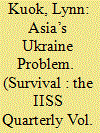

|
|
|
|
|
| Summary/Abstract |
Many Asian governments regard Russia’s war with Ukraine as a distant event with limited impact on the region, beyond rising food and energy prices and possibly increasing the risk of China attacking Taiwan. But the war has strained the rule of law and is entrenching ideological divisions, introducing unnecessary complexity into alliances and partnerships. Asian governments should be alert to the negative implications of these developments for regional peace and security. For them to condemn Russia’s invasion of Ukraine and defend the rule of law would not be to blindly support the West, and would be entirely consistent with their national interests. The West, for its part, should avoid worsening geopolitical fault lines. To this end, the United States might refrain from characterising great-power competition as a battle between autocracies and democracies, and from painting China and Russia with the same broad ideological brush.
|
|
|
|
|
|
|
|
|
|
|
|
|
|
|
|
| 2 |
ID:
181686
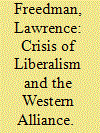

|
|
|
|
|
| Summary/Abstract |
Liberalism as the ideology of the Western alliance is in crisis. Having seen off Nazism and communism, it gained influence after the end of the Cold War, which produced optimism about security, human rights and global prosperity. Now liberalism, shaken by the financial crisis and the wars in Afghanistan and Iraq, is in retreat. Illiberal states, notably China and Russia, are reshaping the international system. Liberalism may not be able to continue to bind allies together, or enable them to cooperate effectively in a severe crisis. There are three counters to a gloomy prognosis, however. Firstly, heightened great-power competition has reinforced rather than undermined the alliance. Secondly, Russia and China have no substantial alliances, and are showing that authoritarian governments face serious problems of their own, including entrenched leaderships. Thirdly, liberalism remains better equipped to adapt to new circumstances.
|
|
|
|
|
|
|
|
|
|
|
|
|
|
|
|
| 3 |
ID:
162791
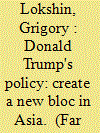

|
|
|
|
|
| Summary/Abstract |
The content of the new Asian doctrine of US President Donald Tramp and his plans to form a "Quad" is the first step toward creating a new type of military bloc for Asia in order to contain China. This topic is highly relevant because of the changing situation in the wider region where Russia has its own major economic and geostrategic interests. The plans to form the Quad directly threaten the marginalization of ASEAN and the end of the Association's leading role in resolving regional issues.
|
|
|
|
|
|
|
|
|
|
|
|
|
|
|
|
| 4 |
ID:
181687
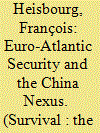

|
|
|
|
|
| Summary/Abstract |
As China has emerged over the past decade as a peer competitor of the United States, the bilateral relationship has become confrontational. Given the relatively wide range of possible strategic outcomes, Europe’s primary task is to organise itself for uncertainty. It must also assume that the US will react negatively if Europe is seen as running counter to America’s policy in the Indo-Pacific and build resilience into its policies to deal with sudden shifts in US policy. Europe’s overarching aims should be defending itself against a revisionist Russia, insulating Europe against direct Chinese coercion, helping like-minded countries prevent China from overwhelming the rules-based international order and avoiding a major war between nuclear powers. Despite the acrimony in the China–US relationship, the fear of nuclear annihilation that helped keep the Cold War cold is notably absent. Trust, especially among allies, is therefore paramount.
|
|
|
|
|
|
|
|
|
|
|
|
|
|
|
|
| 5 |
ID:
184983
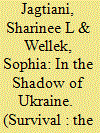

|
|
|
|
|
| Summary/Abstract |
In 2022, India captured global attention over its response to the war in Ukraine. While calling for both parties’ return to diplomacy, India abstained from several United Nations resolutions condemning Russian aggression. For a country that ostensibly subscribes to the values of democracy and territorial integrity, its response appeared frustrating and contradictory, but it is broadly consistent with its long-standing policy of non-alignment. Although India’s relationship with China is increasingly contentious, New Delhi is not yet fully convinced that it is in India’s interest to swing westwards. The country’s relations with Russia and China are deep, complex and substantive. In addition to the military and economic benefits it derives from its connection with Russia, New Delhi and Moscow share an avowed preference for a more equal, multipolar world. India will eventually have to reflect on the extent to which it can sustain its balancing act.
|
|
|
|
|
|
|
|
|
|
|
|
|
|
|
|
| 6 |
ID:
187775


|
|
|
|
|
| Publication |
Mumbai, FINS, 2022.
|
| Description |
xii, 438p.pbk
|
| Standard Number |
9788193196069
|
|
|
|
|
|
|
|
|
|
|
|
Copies: C:1/I:0,R:0,Q:0
Circulation
| Accession# | Call# | Current Location | Status | Policy | Location |
| 060240 | 355.033091824/FIN 060240 | Main | On Shelf | General | |
|
|
|
|
| 7 |
ID:
186391
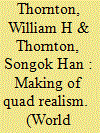

|
|
|
|
|
| Summary/Abstract |
Once again, the world is polarizing along ideological lines and this time India can neither stand aside nor stand alone. In the face of China's mounting provocations and patent military superiority, Narendra Modi knows that India has no choice but to seek security through Sino-resistant channels like the Quadrilateral Security Dialogue (or Quad), in league with America, Japan, and Australia. It is no accident that India's most dependable allies are liberal democracies. This puts Modi in a stupendous ideological bind. The Davos globalism he has courted in the past was so economistic that his domestic repression was all but ignored. Now, however, he is playing in a liberal international league where his style of Bharatiya Janata Party (BJP) autocracy will not be condoned. His fate as well as India's hinges on how he navigates a post-globalist geopolitics that is presently defined by the moral realism of the Biden Doctrine.
|
|
|
|
|
|
|
|
|
|
|
|
|
|
|
|
| 8 |
ID:
166125
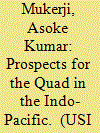

|
|
|
|
|
| Summary/Abstract |
Prospects for the Quadrilateral Security Dialogue (Quad) amongst Australia, India, Japan and the United States have been the focus of increased attention following the identification of an Indo-Pacific strategic framework, which has been endorsed by the four countries. The centrality of ASEAN in the Indo-Pacific has been emphasised by the Quad. To take the dialogue forward, the Quad needs to urgently converge existing divergences regarding their individual definitions of the Indo-Pacific. Equal participation of all four Quad countries in maritime security cooperation is crucial for a Free and Open Indo-Pacific region. Three issues which require priority attention for realising the full potential of the Quad are the identification of a common framework of international law to uphold a “rules-based order”; implementing connectivity projects with a view to integrating the hinterland of land-locked states of Asia and Africa into the Indo-Pacific region; and integrating the security of all the major sea lanes of communication in the broad Indo-Pacific region into the Quad’s strategic footprint. This will require upholding the principle of international cooperation, so that the Quad can contribute constructively to securing an inclusive Indo-Pacific at a time of increased great power rivalry.
|
|
|
|
|
|
|
|
|
|
|
|
|
|
|
|
|
|
|
|
|